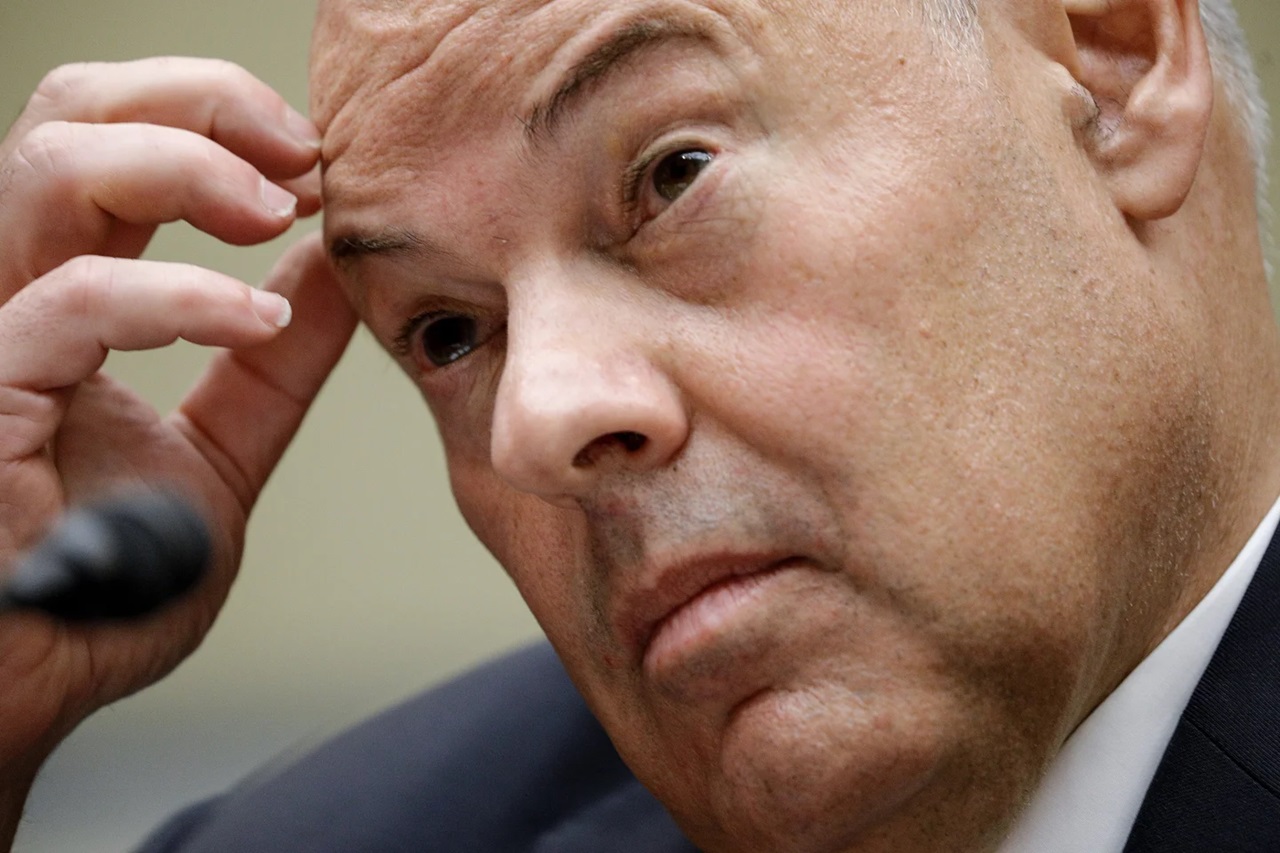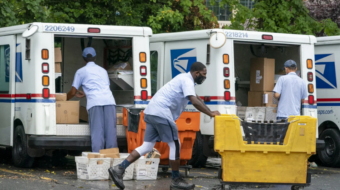
Editor’s note: Bill Knight from the Labor Paper is, like People’s World, a member of the International Labor Communications Association.
DOWNERS GROVE, Ill. —Trumpite Postmaster General Louis DeJoy’s “postal reorganization” plan, featuring first-class mail delays, thousands of lost jobs, and closure of hundreds of sorting centers, could delay tens of thousands of mailed-in ballots in this fall’s election–so much that local election boards will have to throw them out, uncounted.
So says Illinois Letter Carriers Association President Luis Rivas Jr., in an interview with Peoples World and the Press Associates Union News Service just before he headed for his union’s March 25 informational picket line in front of a hotel where DeJoy spoke in the Chicago suburb of Downers Grove.
Rivas explained that under congressional pressure four years ago, DeJoy had to quickly implement a plan to ensure all mailed-in ballots were collected fast and delivered fast to local election boards, to meet post-election counting deadlines. But there was no such plan for this year’s primaries and none appears to be on the horizon, he added.
The workers on the picket line drew heavyweight labor and political support, led by Senate Majority Whip Dick Durbin, D-Ill., and state AFL-CIO President Tim Drea. Inside, DeJoy touted his 10-year plan. It’s drawn worker and customer flak ever since DeJoy, former CEO of non-union XPO Logistics, a package delivery firm, unveiled it.
DeJoy’s “Delivering for America” plan features longer delivery times for first-class mail and “reevaluating” i.e. closing mail sorting centers. Combined, that could slow mail-in and absentee ballot delivery so much that it would arrive “too late” to count in this fall’s election nationally, Rivas says.
Left unsaid: Those uncounted ballots could affect the election’s outcome, especially in swing states.
The picketing and speeches in Downers Grove against GOP big giver DeJoy’s scheme were not the only flak the USPS boss’s plan drew in Illinois. In mid-state Peoria, unionists, business owners, residents, Democrats, and Republicans jammed a February 21 presentation on it by USPS executives, Bill Knight reported in The Labor Paper. They weren’t happy.
As one example, Rivas notes that DeJoy wants to close the mail sorting center in the Rock Island area in northwest Illinois and shift all sorting for that region to Des Moines, Iowa.
That’s 171 miles—a two-hour-37-minute drive—away. Letter Carriers would have to drive to Des Moines, pick up their mail there, drive back, then begin their routes. And the Rock Island sorting center workers, like their colleagues elsewhere, would face a drastic choice: Move—including a distress sale of your house—or quit.
“When people don’t get the services they expect from the USPS, that’ll drive people away and we’ll lose even more,” Rivas says. “Our rates are going up and our service is going down.”
The USPS, “under the guise of upgrading the system,” wants to close sorting facilities in Peoria and Urbana-Champaign to the suburban Chicago sorting center in Bedford Park, The Labor Paper reported. Mail now sorted in the state capital of Springfield would be sorted in St. Louis, Mo. One-way distances for those drives are 156, 128, and 95 miles, respectively.
“Letter Carriers have to walk from house to house” and while it’s easy in Chicago and even Downers Grove, it’s harder and longer in rural communities, Rivas explained. They often don’t finish until after nightfall. As a result, needed medications and other important mail is often delayed.
Pickups also decline under DeJoy’s plan, Rivas said. “In Chicago, we have two to three pickups” from corner mailboxes in the morning “and three to four in the afternoon,” but that will decline. That’s because DeJoy emphasizes processing packages and boxes, and downgrades first-class mail, a common complaint of customers and from Durbin and other lawmakers.
Postal Workers Local 854 President Bud Toft told the Peoria capacity crowd that DeJoy’s real aim is to privatize the Postal Service. When former Republican Oval Office occupant Donald Trump—his party’s nominee again this fall—forced DeJoy on the former USPS board, Trump and his White House ideologues made clear in budget documents and statements that postal privatization was their real aim.
“DeJoy attacked the Postal Service by ending delivery standards, ending or limiting mail transportation by air” and closing the distribution centers, Toft said. DeJoy also wants to privatize so “new owners can hire minimum-wage part-time workers so their profits would be higher.”
Privatization would also let USPS dump union contracts with the Letter Carriers, the Postal Workers, and other unions, halt 7-day service, and reduce rural routes, all in the name of profits, Toft said. The seven-day service and the rural routes are strong selling points for the USPS.
DeJoy has an “insidious agenda of downsizing processing facilities, deliberately slowing down mail delivery, and unjustifiably inflating prices,” Sen. Durbin told the crowd in Downers Grove. “It undermines the fundamental principle of universal access to reliable postal services for all Americans.
“DeJoy’s actions threaten to unravel the fabric of our communities, particularly in rural and underserved areas, where timely mail is a lifeline for essential goods, services, and communication. We must send a clear message this scheme, with its blatant disregard for the public good, should be marked ‘return to sender.’”
Despite the dissatisfaction with DeJoy and congressional bipartisan complaints ranging the ideological spectrum from progressive Sen. Bernie Sanders, Ind-Vt., to extreme MAGAite Rep. Mary Miller, R-Ill., NALC doesn’t want him gone, Rivas conceded. That’s because the union is in the middle of bargaining with USPS for a new contract for its almost 300,000 members.
“We want stability” in those talks, Rivas explained. “But APWU wants him gone and I believe it’s the same with the other unions—and with the rank and file.”
We hope you appreciated this article. At People’s World, we believe news and information should be free and accessible to all, but we need your help. Our journalism is free of corporate influence and paywalls because we are totally reader-supported. Only you, our readers and supporters, make this possible. If you enjoy reading People’s World and the stories we bring you, please support our work by donating or becoming a monthly sustainer today. Thank you!











